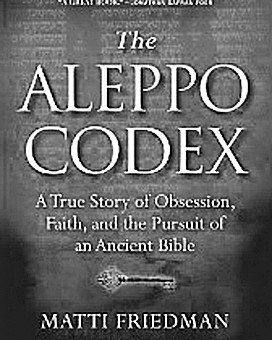The Kosher Bookworm: The Aleppo Factor and the War to Come
Earlier this year, as the turmoil in Syria started to get a sense of reality, I stated to my students, some of whom were of Syrian heritage, that the one factor that will indicate to us the seriousness of the civil unrest in Syria, will be what ultimately happens in Aleppo, the commercial center of Syria.
This past week, my premonitions concerning this unfolding human tragedy are coming true, and the human toll has started to balloon to genocidal proportions.
Before the ascendancy of the Assad dynasty in the early 1970s, Syria was known politically as the mad house of the Middle East, with a coup occurring once every six months. The Assad takeover brought an end to this political destabilization and gave Syria a measure of political tranquility. However, this also brought this beleaguered country a demonic regime that closely matched that of its murderous Soviet patrons in the Communist Bloc.
Further, the Assad regime was complicit in the murderous aggression of the Yom Kippur War that came within miles of a major devastation of northern Israel, all fueled by communist arms and ideology. So, therefore, given these factors, there will be no great amount of tears to be shed from all peace loving people of good-will, both near and far from the conflict, over Bashar al-Assad’s demise.
However, it is the Aleppo factor that has had me most mystified over this past year.
Aleppo should be familiar to our readers inasmuch as its Jewish religious legacy was the subject of a review earlier this month. And now, as fate would have it, the media is reporting that credible hostilities against the Assad regime are in full swing. And, as a result, with the focus now upon this most storied of Arab cities, Aleppo will once again be the focus of my column.
Among the most sober analysts of the Middle East scene, is the London Telegraph’s Adrian Blomfield whose dispatch of July 25th was the source of much valued historical information.
Blomfield notes that Aleppo is geographically located near the Turkish border at the end of the proverbial Silk Road from China, “making it a hugely important trading centre for centuries and leaving it with its fabulous architectural legacy of caravanserais and souks.
Its importance was internationally recognized: when the English Levant Company was looking for a Middle East headquarters in the late 16th century, it chose Aleppo.”
With this prologue, we can now better understand the symbolic as well as logistical importance that Aleppo has come to represent to observers of this tragic scene.
A once united city, committed to political as well as religious stability, has now come apart, with radical Islamists on the ascendancy. Further, and most ominous to this writer, according to Blomfield, is that “in Aleppo itself, much of the Sunni working class has turned against the regime, something that has manifested itself in a series of arson attacks on factories in the city in recent months. The factory owners are starting to realize that support for the regime is no longer in their interest. Their employees have turned, trade has been paralyzed because it is impossible to move goods to the nearby Turkish border, and the uprising has plunged the country into economic crisis.”
By the time you read these words, the die will have been cast as to the fate and longevity of the Assad regime. What will concern many of us, will be the implications all this will have upon American policy and upon the physical well-being of Israel. The irony of the Aleppo legacy in what is transpiring now should not be lost upon us, for it was in Aleppo that an icon of our faith was both preserved and ultimately plundered and lost to history.
In a recent book, “The Aleppo Codex,” [Algonquin Books, 2012] journalist Matti Friedman of The Times of Israel authored a riveting report concerning the fate of one of history’s most accurate texts of our Bible, a text written in Tiberias over a thousand years ago and held to be accurate by none other than the Rambam himself.
While it is not my intention in this essay to give my personal value judgment of what transpired with this sacred document, I would like to share with you the book’s author’s heartfelt feelings concerning this sad saga of the theft of a Tanach that bears the name of a city now central to the affairs of state that will have an impact upon us for many years to come.
Friedman makes the following observations whose words must be seriously taken to heart:
“The hunger for old and beautiful things is not new. Paintings and other works of art are routinely stolen and fenced for large sums. But here the object stolen is not a thing of beauty but a book that condemns theft. The page with the passage, ‘Thou shalt not steal’
was stolen. Also missing are the commandments not to bear false witness, covert another’s property, or commit murder. All of which have been violated in these chapters.
The Hebrew Bible, of which our code was the most perfect copy, the one used by Maimonides himself, was meant to serve humans as a moral compass. Its story is a tragedy of human weakness.”
How sad for us, and for all humanity, at so sad a time in the history of our civilization.

 55.0°,
Mostly Cloudy
55.0°,
Mostly Cloudy 







